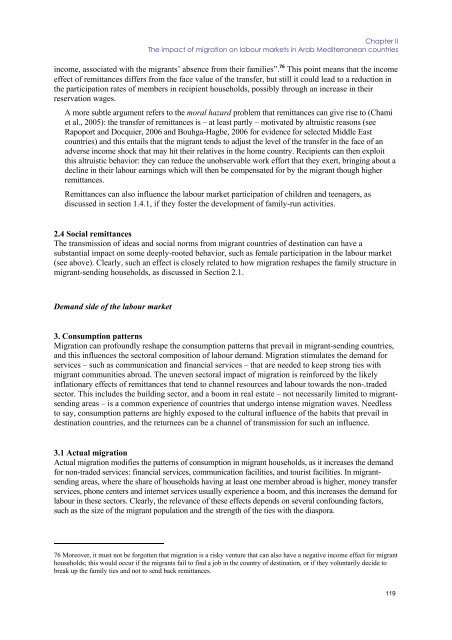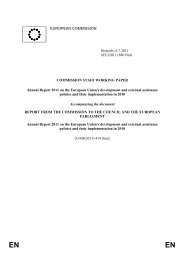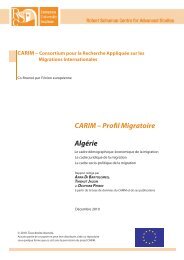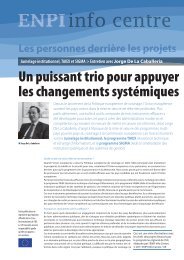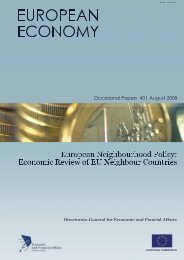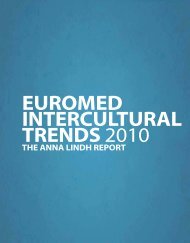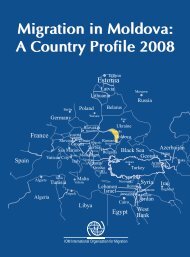<strong>European</strong> CommissionOccasional Paper 60, Volume I1.5 Social remittancesThe transmission of ideas from migrant countries of destination can modify some behaviors – such asthe female participation to the labour <strong>market</strong>, which is discussed in section 2.4 – which, in turn, havean impact on fertility choices (Fargues, 2007a; Fargues, 2007b; Beine et al., 2009). This transmissionof demographic norms from the countries of destination to the countries of origin has a delayed impacton the labour <strong>market</strong>, as it influences the size of the cohorts which enter the labour <strong>market</strong> 20 yearslater. This entails that the past <strong>migration</strong> record of a country influences the current demographicpressure on the labour <strong>market</strong>.2. Behavior in the labour <strong>market</strong>Section 1 has analyzed the impact that <strong>migration</strong> exerts on a country’s endowment of labour eitherdirectly or indirectly through the influence it can produce on the incentives to invest in education. Still,<strong>migration</strong> can also influence the behavior of working-age individuals on the domestic labour <strong>market</strong>.Migration influences both the ability to take up a job offer – through the reshaping of family structuresthat it induces, <strong>and</strong> the willingness to do so – through the income effect brought about by <strong>migration</strong><strong>and</strong> remittances. Even social remittances can significantly influence behavior on the labour <strong>market</strong>, asdestination countries often differ in features such as the rate of female participation.2.1 Actual <strong>migration</strong>The <strong>migration</strong> of a family member can have a relevant impact on family structures. If the member whomigrates leaves some children behind, then this can lead to a significant reshaping of family structures.His – or, less likely, her – spouse can go back to their parents’ house, in order to have someone whocan help them in taking care of the children left behind. Bryant (2005) observes that “children ofmigrants are more likely to have relatives from outside the nuclear family living in the samehousehold, especially if both parents are overseas”. This entails that <strong>migration</strong> could per se fosterfemale participation in the labour <strong>market</strong>, as women can more easily rely on relatives to take care oftheir children.2.3 Prospect to migrateThe prospect to migrate can have an impact on the participation rate or on the reserve wage ofdomestic workers (Fan <strong>and</strong> Stark, 2007a). The latter effect can be channeled through the culturalinfluence that destination countries exert, as people adjust their perception with respect to whatrepresents a fair wage. Would-be migrants adopt a wait <strong>and</strong> see strategy, devoting their efforts toprepare their <strong>migration</strong> project, <strong>and</strong> turning down low-paid job offers. If the prospect to migrateinduces some individuals to give up any attempt to actively look for a job – so that they are no longerrecorded as being unemployed – then this could further reduce the unemployment rate, though it isdoubtful, to say the least, that the country would gain from this further reduction.2.3 RemittancesRemittances can reduce the work effort of the members of recipient households (see the recentempirical contribution by Cox Edwards <strong>and</strong> Rodriguez-Oreggia, 2009). This can come about with thepositive income effect brought about by remittances, although one should be aware of not takingremittances at their face value. Remittances are not just added to other household income sources.Rather they have to replace the lost domestic income of the migrant, who is often the main breadwinnerin the household. As Acosta et al. (2006) observe, “<strong>migration</strong> also entails potential losses of118
Chapter IIThe impact of <strong>migration</strong> on labour <strong>market</strong>s in Arab Mediterranean countriesincome, associated with the migrants’ absence from their families”. 76 This point means that the incomeeffect of remittances differs from the face value of the transfer, but still it could lead to a reduction inthe participation rates of members in recipient households, possibly through an increase in theirreservation wages.A more subtle argument refers to the moral hazard problem that remittances can give rise to (Chamiet al., 2005): the transfer of remittances is – at least partly – motivated by altruistic reasons (seeRapoport <strong>and</strong> Docquier, 2006 <strong>and</strong> Bouhga-Hagbe, 2006 for evidence for selected Middle Eastcountries) <strong>and</strong> this entails that the migrant tends to adjust the level of the transfer in the face of anadverse income shock that may hit their relatives in the home country. Recipients can then exploitthis altruistic behavior: they can reduce the unobservable work effort that they exert, bringing about adecline in their labour earnings which will then be compensated for by the migrant though higherremittances.Remittances can also influence the labour <strong>market</strong> participation of children <strong>and</strong> teenagers, asdiscussed in section 1.4.1, if they foster the development of family-run activities.2.4 Social remittancesThe transmission of ideas <strong>and</strong> social norms from migrant countries of destination can have asubstantial impact on some deeply-rooted behavior, such as female participation in the labour <strong>market</strong>(see above). Clearly, such an effect is closely related to how <strong>migration</strong> reshapes the family structure inmigrant-sending households, as discussed in Section 2.1.Dem<strong>and</strong> side of the labour <strong>market</strong>3. Consumption patternsMigration can profoundly reshape the consumption patterns that prevail in migrant-sending countries,<strong>and</strong> this influences the sectoral composition of labour dem<strong>and</strong>. Migration stimulates the dem<strong>and</strong> forservices – such as communication <strong>and</strong> financial services – that are needed to keep strong ties withmigrant communities abroad. The uneven sectoral impact of <strong>migration</strong> is reinforced by the likelyinflationary effects of remittances that tend to channel resources <strong>and</strong> labour towards the non-.tradedsector. This includes the building sector, <strong>and</strong> a boom in real estate – not necessarily limited to migrantsendingareas – is a common experience of countries that undergo intense <strong>migration</strong> waves. Needlessto say, consumption patterns are highly exposed to the cultural influence of the habits that prevail indestination countries, <strong>and</strong> the returnees can be a channel of transmission for such an influence.3.1 Actual <strong>migration</strong>Actual <strong>migration</strong> modifies the patterns of consumption in migrant households, as it increases the dem<strong>and</strong>for non-traded services: financial services, communication facilities, <strong>and</strong> tourist facilities. In migrantsendingareas, where the share of households having at least one member abroad is higher, money transferservices, phone centers <strong>and</strong> internet services usually experience a boom, <strong>and</strong> this increases the dem<strong>and</strong> forlabour in these sectors. Clearly, the relevance of these effects depends on several confounding factors,such as the size of the migrant population <strong>and</strong> the strength of the ties with the diaspora.76 Moreover, it must not be forgotten that <strong>migration</strong> is a risky venture that can also have a negative income effect for migranthouseholds; this would occur if the migrants fail to find a job in the country of destination, or if they voluntarily decide tobreak up the family ties <strong>and</strong> not to send back remittances.119
- Page 5 and 6:
STUDYLABOUR MARKETS PERFORMANCE AND
- Page 7 and 8:
Table of ContentsLABOUR MARKETS PER
- Page 10:
8.1 Actual migration and consumptio
- Page 15 and 16:
Chapter IFinal Report 15 MILLION NE
- Page 17 and 18:
Chapter IFinal Report …so that MI
- Page 19 and 20:
Chapter IFinal Reportroots). The cu
- Page 21 and 22:
Chapter IFinal Report In AMCs, REMI
- Page 23 and 24:
Chapter IFinal Reportpolicies. This
- Page 25 and 26:
Chapter IFinal ReportMediterranean
- Page 27 and 28:
Chapter IFinal ReportMore recently,
- Page 29 and 30:
Chapter IFinal Reportfor EU employm
- Page 31 and 32:
Chapter IFinal Reportchosen, these
- Page 33 and 34:
Chapter IFinal Reportexit of women
- Page 35 and 36:
Chapter IFinal ReportFigure 1.2.1.
- Page 37 and 38:
Chapter IFinal ReportA Declining Em
- Page 39 and 40:
Chapter IFinal ReportThe same year,
- Page 41 and 42:
Chapter IFinal ReportTable 2.2.1. I
- Page 43 and 44:
Chapter IFinal Reportminimum wages
- Page 45 and 46:
Chapter IFinal Report2.4 Unemployme
- Page 47 and 48:
Chapter IFinal ReportYouth Unemploy
- Page 49 and 50:
Chapter IFinal ReportBut one should
- Page 51 and 52:
Chapter IFinal Reportmillion) 10 .
- Page 53 and 54:
Chapter IFinal Reportmight intensif
- Page 55 and 56:
Chapter IFinal Reporttrue labour ma
- Page 57 and 58:
Chapter IFinal Reportto reform the
- Page 59 and 60:
Chapter IFinal ReportFrom a differe
- Page 61 and 62:
Chapter IFinal ReportTable 4.2.1 Ou
- Page 63 and 64:
Chapter IFinal ReportSource: Adams
- Page 65 and 66:
Chapter IFinal Reportin the destina
- Page 67 and 68:
Chapter IFinal ReportIn conclusion,
- Page 69 and 70: Chapter IFinal Reportorganised in B
- Page 71 and 72: Chapter IFinal Reportsecond Intifad
- Page 73 and 74: Chapter IFinal Reportstands at 29.7
- Page 75 and 76: Chapter IFinal Reportconstruction w
- Page 77 and 78: Chapter IFinal ReportAs far as the
- Page 79 and 80: Chapter IFinal Reportother cases, l
- Page 81 and 82: Chapter IFinal Reportunemployment a
- Page 83 and 84: Chapter IFinal Reportof Egypt, so f
- Page 85 and 86: Chapter IFinal ReportWhile progress
- Page 87 and 88: Chapter IFinal ReportThese reservat
- Page 89 and 90: Chapter IFinal ReportAs Figure 6.3.
- Page 91 and 92: Chapter IFinal Reportin skill devel
- Page 93 and 94: Chapter IFinal ReportThe Directive
- Page 95 and 96: Chapter IFinal ReportThe need for
- Page 97 and 98: Chapter IFinal Reportobjectives are
- Page 99 and 100: Chapter IFinal Reporttrue Euro-Medi
- Page 101 and 102: Chapter IFinal Report- Putting empl
- Page 103 and 104: Chapter IFinal Report promotion of
- Page 105 and 106: Chapter IFinal ReportOtherADAMS, R.
- Page 107 and 108: Chapter IFinal ReportDE BEL-AIR, F.
- Page 109 and 110: Chapter IFinal ReportGUPTA, S., C.
- Page 111 and 112: Chapter IFinal ReportOECD (2000): M
- Page 113 and 114: Chapter II - Thematic Background Pa
- Page 115 and 116: Chapter IIThe impact of migration o
- Page 117 and 118: Chapter IIThe impact of migration o
- Page 119: Chapter IIThe impact of migration o
- Page 123 and 124: Chapter IIThe impact of migration o
- Page 125 and 126: Chapter IIThe impact of migration o
- Page 127 and 128: Chapter IIThe impact of migration o
- Page 129 and 130: Chapter IIThe impact of migration o
- Page 131 and 132: Chapter IIThe impact of migration o
- Page 133 and 134: Chapter IIThe impact of migration o
- Page 135 and 136: Chapter IIThe impact of migration o
- Page 137 and 138: Chapter IIThe impact of migration o
- Page 139 and 140: Chapter IIThe impact of migration o
- Page 141 and 142: Chapter IIThe impact of migration o
- Page 143 and 144: Chapter IIThe impact of migration o
- Page 145 and 146: Chapter IIThe impact of migration o
- Page 147 and 148: Chapter IIThe impact of migration o
- Page 149 and 150: Chapter IIThe impact of migration o
- Page 151 and 152: Chapter IIThe impact of migration o
- Page 153 and 154: Chapter IIThe impact of migration o
- Page 155 and 156: Chapter IIThe impact of migration o
- Page 157 and 158: Chapter IIThe impact of migration o
- Page 159 and 160: Chapter IIThe impact of migration o
- Page 161 and 162: Chapter III - Thematic Background P
- Page 163 and 164: Chapter IIIEU Migration Policy towa
- Page 165 and 166: Chapter IIIEU Migration Policy towa
- Page 167 and 168: Chapter IIIEU Migration Policy towa
- Page 169 and 170: Chapter IIIEU Migration Policy towa
- Page 171 and 172:
Chapter IIIEU Migration Policy towa
- Page 173 and 174:
Chapter IIIEU Migration Policy towa
- Page 175 and 176:
Chapter IIIEU Migration Policy towa
- Page 177 and 178:
Chapter IIIEU Migration Policy towa
- Page 179 and 180:
Chapter IIIEU Migration Policy towa
- Page 181 and 182:
Chapter IIIEU Migration Policy towa
- Page 183 and 184:
Chapter IIIEU Migration Policy towa
- Page 185 and 186:
Chapter IIIEU Migration Policy towa
- Page 187 and 188:
Chapter IIIEU Migration Policy towa
- Page 189 and 190:
Chapter IIIEU Migration Policy towa
- Page 191 and 192:
Chapter IIIEU Migration Policy towa
- Page 193 and 194:
Chapter IIIEU Migration Policy towa
- Page 195 and 196:
Chapter IIIEU Migration Policy towa
- Page 197 and 198:
Chapter IIIEU Migration Policy towa
- Page 199 and 200:
Chapter IIIEU Migration Policy towa
- Page 201 and 202:
Chapter IIIEU Migration Policy towa
- Page 203 and 204:
Chapter IIIEU Migration Policy towa
- Page 205 and 206:
Chapter IIIEU Migration Policy towa
- Page 207:
Chapter IIIEU Migration Policy towa


